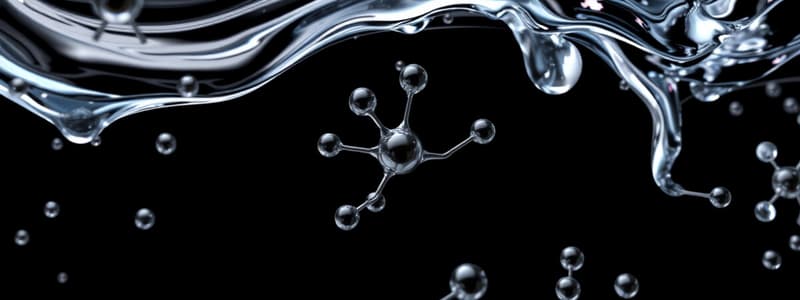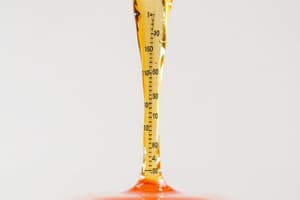Podcast
Questions and Answers
What is viscosity?
What is viscosity?
A measure of the resistance of a liquid to flow, which is affected by the size and shape of particles, and generally increases as the temperature decreases and as intermolecular forces increase.
What explains the behavior of solids and liquids?
What explains the behavior of solids and liquids?
Kinetic Molecular Theory
What do intermolecular forces affect?
What do intermolecular forces affect?
Viscosity, surface tension, cohesion, and adhesion.
How are crystalline solids classified?
How are crystalline solids classified?
When does matter change phase?
When does matter change phase?
What is the boiling point?
What is the boiling point?
What is condensation?
What is condensation?
What is deposition?
What is deposition?
What is evaporation?
What is evaporation?
What is the freezing point?
What is the freezing point?
What is melting point for a crystalline solid?
What is melting point for a crystalline solid?
What is a phase diagram?
What is a phase diagram?
What is the triple point?
What is the triple point?
What is vaporization?
What is vaporization?
What is vapor pressure?
What is vapor pressure?
When are states of a substance referred to as phases?
When are states of a substance referred to as phases?
When do energy changes occur?
When do energy changes occur?
What is an allotrope?
What is an allotrope?
What is an amorphous solid?
What is an amorphous solid?
What is a crystalline solid?
What is a crystalline solid?
What is a surfactant?
What is a surfactant?
What is surface tension?
What is surface tension?
What is a unit cell?
What is a unit cell?
What are intermolecular forces?
What are intermolecular forces?
What is a dipole-dipole force?
What is a dipole-dipole force?
What are dispersion forces?
What are dispersion forces?
What is a hydrogen bond?
What is a hydrogen bond?
Which are stronger, intramolecular or intermolecular forces?
Which are stronger, intramolecular or intermolecular forces?
What explains the different properties of solids, liquids, and gases?
What explains the different properties of solids, liquids, and gases?
What explains the expansion, diffusion, exertion, compression, and pressure of gases?
What explains the expansion, diffusion, exertion, compression, and pressure of gases?
What is the unit used to report air pressure?
What is the unit used to report air pressure?
What is a barometer?
What is a barometer?
Flashcards are hidden until you start studying
Study Notes
Viscosity and Phase Changes
- Viscosity: Measures resistance of liquids to flow; influenced by particle size, shape, temperature, and intermolecular forces.
- Phase Changes: Occur when energy is added or removed, leading to transitions between solid, liquid, and gas states.
- Freezing Point: Temperature at which a liquid becomes a crystalline solid; melting point is the opposite.
Intermolecular Forces and Properties
- Intermolecular Forces: Includes dispersion forces, dipole-dipole forces, and hydrogen bonds; essential for determining states of matter at specific temperatures.
- Surface Tension: Energy needed to increase liquid surface area; affected by intermolecular forces.
- Cohesion and Adhesion: Intermolecular forces also impact these phenomena, influencing how substances interact with each other.
Types of Solids
- Crystalline Solids: Characterized by orderly geometric arrangements of atoms, ions, or molecules; can be classified by shape and composition.
- Amorphous Solids: Lack regular patterns; formed when molten material cools quickly, preventing crystal formation.
- Allotropes: Different structural forms of the same element in the same state, exhibiting distinct properties.
Gas Behavior and Kinetic Molecular Theory
- Kinetic Molecular Theory: Describes the behavior of solids, liquids, and gases based on particle movement and energy. Explains properties like expansion, diffusion, and pressure in gases.
- Vaporization: An energy-requiring process in which a liquid transitions to a gas; evaporation occurs specifically at the liquid's surface.
- Vapor Pressure: Pressure exerted by vapor above a liquid; increases with temperature.
Phase Diagrams and Critical Points
- Phase Diagram: Graph depicting phases of a substance (solid, liquid, gas) related to pressure and temperature.
- Triple Point: Specific conditions where solid, liquid, and gas phases coexist.
- Condensation and Deposition: Energy-releasing processes transforming gas to liquid (condensation) or gas to solid (deposition) without passing through the liquid phase.
Additional Key Terms
- Surfactant: Compounds, like soap, that reduce surface tension in liquids by disrupting hydrogen bonds between water molecules.
- Unit Cell: Smallest repeating structural unit in a crystal lattice that reflects the symmetry of the whole crystal.
- Barometer: Instrument for measuring atmospheric pressure, often used to understand weather patterns.
- Dalton's Law of Partial Pressures: Relates to the behavior of gases and how different gases exert their own pressures within a mixture.
- Atmospheric Pressure (atm): Standard unit for reporting air pressure.
Strength of Forces
- Intramolecular vs. Intermolecular Forces: Intramolecular forces, which hold atoms together within a molecule, are stronger than intermolecular forces.
Studying That Suits You
Use AI to generate personalized quizzes and flashcards to suit your learning preferences.




